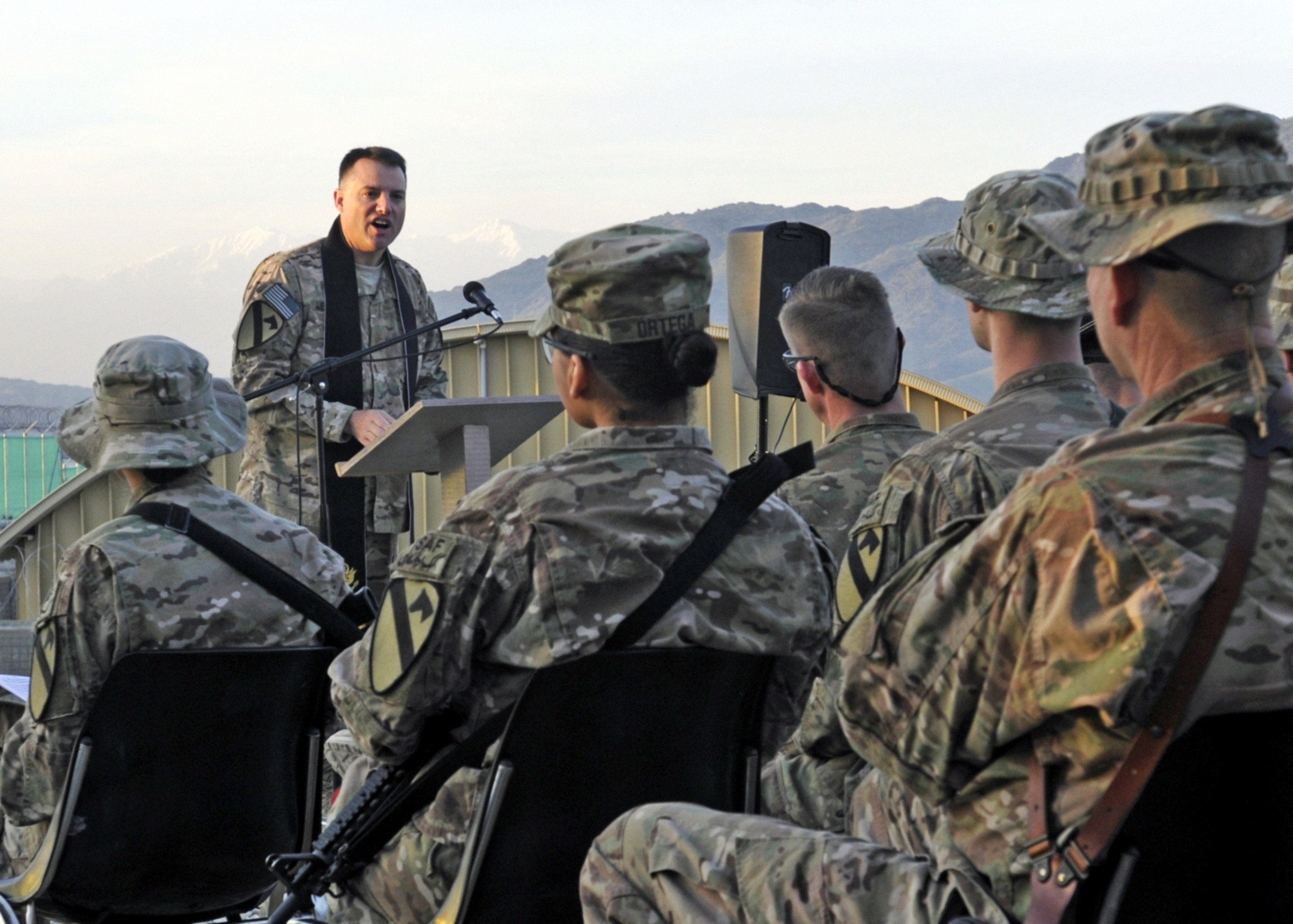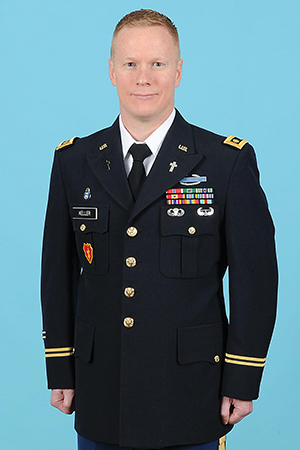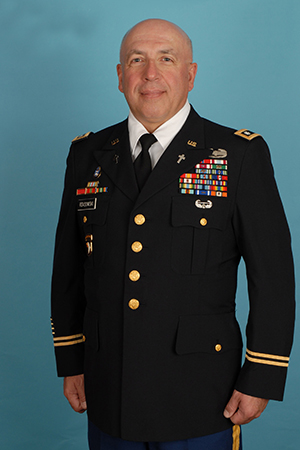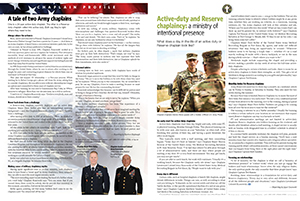
Official U.S. Army Photo
One is a 24-year active-duty chaplain. The other is a Reserve-duty chaplain called into active duty. Both say they’re right where they need to be.


United States Army Medical Recruiting Brigade
Fort Knox, Ky.
Always where the action is
Born, raised and educated in Poland, Chaplain Lieutenant Colonel Jerzy Rzasowski (“Father George”) has been a priest for 33 years — 24 of them as an Army chaplain. It hasn’t been a conventional ministry path; but, by his own account, he has always preferred a challenge.
Ordained in Poland in June 1985, Chaplain Rzasowski worked as a full-time assistant pastor and as a chaplain for Solidarity. This ultimately successful, broad anti-bureaucratic 1980s social movement used the methods of civil resistance to advance the causes of workers’ rights and social change. Solidarity enjoyed significant support (including financial) from Pope John Paul II and the United States.
In 1989, Rzasowski’s bishop sent him to Central America as a missionary through the United States, where he was to return after working in the jungle for years and contracting tropical diseases for which there was no treatment in Poland at this time.
This plan did require US citizenship — a five-year process. While waiting for it, Father George got a phone call from the Army asking him to consider chaplaincy. He was able to join without citizenship (no longer an option) and committed to three years of chaplain service.
After basic training, he was sent to Guantanamo Bay, Cuba, in 1994 to minister to refugees. More than two decades later, he is still in uniform.
“I just love it,” Chaplain Rzasowski says. “I believe everybody, man and woman, should serve their country.”

United States Army Medical Recruiting Brigade
Fort Knox, Ky.
Never back down from a challenge
A Reserve-duty chaplain currently deployed and on active duty, Chaplain Major Dave Keller also has an international ministry background — and, like Chaplain Rzasowski, clearly isn’t one to shy away from a challenge.
After leaving active duty in 2005 as an infantry officer, he worked as an interim pastor in a small Russian village north of St. Petersburg. Keller returned to the United States and worked in the civilian sector for about four years.
All the while, he felt called to do something more. “I said, ‘God, I’ll do anything you want me to do — just give me peace about it.’”
In 2013, God called Keller back into the military. He enrolled in the Army Chaplain Candidate Program. After completion, he served in three different Battalions as a chaplain.
But that’s not all Keller was doing while enrolled in the Chaplain Candidate Program and throughout his accession to chaplaincy. He was also pursing his MDiv at Liberty University; leading a civilian ministry with the American Bible Society and its military ministry team to develop free scriptural resources for service members and their families; and working as a youth minister for Calvary Chapel.
Keller was called into Active Guard Reserve while assigned to Fort Dix, N.J., as a brigade chaplain. He remains there today.
Making sense of military chaplaincy myths
Having spent significant time in civilian ministry, both chaplains seem to have found a “sweet spot” in Army chaplaincy. Here, uniquely, they are able to meet the most urgent ministry needs.
“The most rewarding aspect is just shaking the hand of a Soldier whom you could help,” Chaplain Rzasowski says. “You can sense that if you weren’t there, there would be nobody else [to provide that ministry]. In this moment, you realize, God sent me here and now.”
Keller agrees, pointing out that many Soldiers don’t come to see the chaplain until “the wheels fall off the bus.”
“That can be deflating,” he admits. “But, chaplains are able to wrap their arms around these individuals and speak words of truth, spiritual or otherwise, and really see breakthroughs happen in their lives, marriages, professions and careers.”

As with any calling, of course, military chaplaincy comes with misconceptions and challenges. One question Rzasowski tackles often: “How can you be a chaplain, have a cross, and kill people?” The reality is, he can’t and doesn’t. “We don’t carry arms. That’s it,” he explains. “As chaplains, we are only Soldiers for whom it is forbidden.”
That doesn’t mean chaplains aren’t on the frontlines — on the contrary. “We go there with Soldiers,” he explains. “We face all the dangers they face, but we do not train in shooting or killing.”
For Keller’s part, he often dispels a myth that military chaplains must give up their faith distinctives. “That’s simply not true,” he says. “The Army wants pastors in uniform who best represent their faith denominations and their faith distinctives. Just as Chaplains uphold the First Amendment, we’re also under it.”
Informed advice
Looking back on their own careers, both chaplains have words of wisdom for potential applicants.
Rzasowski urges pastors to accept that they won’t be fully in charge in the Army. “We are to serve the Soldiers, to be with them when they need us,” he explains. “When you say to the commander, ‘Sir, we would like to pray,’ he can say, ‘Chaplain, I have to make a meeting, because we must prepare for war.’ He has the commanding decision.”
Rzasowski acknowledges this dynamic can be difficult for pastors used to being in charge at their churches. He felt that way, himself. Ultimately, though, it has been a blessing.
“This is the beauty: that we are only to serve,” he explains. “When you are told, ‘Chaplain, we need you there,’ you go there.”
For Keller, military chaplaincy has been “the experience of a lifetime — vibrant and versatile.”
“Many will tell you that they would never have imagined meeting the people they’ve met, or going to the places they’ve gone,” he adds. “It’s a double calling to wear the uniform and to serve as a pastor inside it.”
Above all, they both encourage pastors to simply consider Army chaplaincy for themselves, whether it’s Army Reserve or active duty.
“Give a chaplain recruiter a call,” Keller advises. “Very few are qualified, and even fewer are called; but, if you don’t consider it, then you’re not qualified whatsoever. And we really do need pastors and priests in uniform.”
— Reporting by RaeAnn Slaybaugh
To learn more, visit GoArmy.com/Chaplain, call 1-888-550-ARMY (2769), or log on to GoArmy.com/locate-a-recruiter.html.


